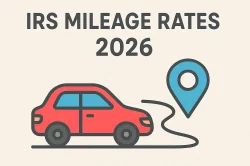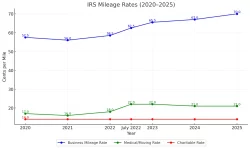IRS Mileage Guide
Home » Mileage Tax Deduction » Charitable Mileage
Last Updated: July 24, 2025
Are you a dedicated volunteer looking to understand how to deduct your driving costs for charity? You’re in the right place! Charitable mileage refers to the miles you drive your personal vehicle to perform services for a qualified charitable organization. You can deduct these miles as a charitable contribution on your federal income tax return. This guide will walk you through the specifics, from current rates to record-keeping, and how you can make the most of this mileage deduction.

Table of Contents
Understanding Charitable Mileage Deductions
Driving for good should also make sense for your wallet. Understanding the ins and outs of charity mileage deductions can help you keep more of your hard-earned money.
Key Facts and Current Rates
For both 2025, the IRS-set charitable mileage rate is 14 cents per mile. It’s important to note that this rate has remained the same since 1998, which is much lower than the rates for business or medical mileage. This long-standing disparity is a hot topic, especially among volunteers who bear significant out-of-pocket costs.
Alternatively, you have the option to deduct your actual expenses. This means you can count your out-of-pocket costs for gas and oil directly tied to your charitable activity. However, you can’t include general repairs, depreciation, insurance, or general vehicle wear and tear if you choose this method.
Who Qualifies and What Counts?
To claim the charitable mileage deduction, you must itemize your deductions on your tax return. This means you’ll use Schedule A (Form 1040) instead of taking the standard deduction.
Qualifying Activities must be directly related to volunteer work for an IRS-recognized 501(c)(3) charity. This includes driving to:
- Soup kitchens to serve meals
- Animal shelters to walk dogs
- Food banks to deliver supplies
- Hospitals to transport patients
- Disaster sites for relief efforts
However, there are things that do not count. You cannot deduct mileage for:
- Driving someone else to a charitable event if you aren’t the one performing the service. Only the volunteer can claim the deduction.
- Commuting to and from your regular job, even if your employer is a charity.
- General vehicle maintenance or insurance, even if your car is used solely for charity.
For a full guide on the rules of charitable contributions, you can refer to IRS Publication 526 or you can read tips on charity travel here: IRS Offers Tips on Charity Travel.
The Push for Change: Legislative Updates
Despite the consistent 14-cent rate, there’s significant momentum to change it. In 2025, the Volunteer Driver Tax Appreciation Act (S.1177/H.R. 1582) was reintroduced in the U.S. Congress. This bill aims to raise the charitable mileage rate to match the business rate for those who transport people or goods for charities. Major nonprofits like the American Red Cross and Meals on Wheels are strong supporters of this initiative.
The National Taxpayer Advocate has also recommended moving towards one standardized mileage deduction rate. This would simplify things, reduce confusion, and hopefully encourage more people to volunteer. The current low rate often doesn’t cover actual gas costs, which can deter potential volunteers, especially in areas with high fuel prices.

Ensuring Your Claim is Audit-Proof
To actually get your charitable mileage deduction, you need to keep excellent records. The IRS is very clear about documentation, and without it, your deduction can be denied.
Required Documentation
If you want to deduct your actual gas and oil expenses related to charity, keep your refueling receipts to support your claim.
However, if you want to deduct the charity mileage rate, keep accurate records of every mile driven for charitable purposes. What does this mean? You need a detailed mileage log that includes:
- Date of the trip: The specific day you drove.
- Name of the charity: The qualified organization you volunteered for.
- Purpose of the trip: A brief description of the service you performed (e.g., “delivered meals” or “drove to shelter to walk dogs, etc.).
- Starting point and Destination: Where you drove to and from.
- Total mileage: This validates the total miles driven.
Many volunteers use apps to track their mileage, which the IRS accepts as valid documentation. The key however is consistency and detail. Here’s a quick video overview in the topic.
Optimize Your Charitable Mileage Deduction with MileageWise
When it comes to keeping impeccable mileage logs, especially for charitable mileage, you need a solution that is accurate, efficient, and IRS-compliant. That’s where MileageWise steps in, offering cutting-edge technology designed to simplify your tax preparation and maximize your deductions.
Here’s how MileageWise can transform your mileage tracking:
App to Track Charitable Mileage
- Automatic Trip Logging: Capture every charitable drive without lifting a finger.
- Simple Setup: Get started in minutes and focus on giving back, not fumbling with tech.
- Ad-Free & Private: No distractions —your volunteer mileage stays secure and clutter-free.
- Reliable Mileage Capture: Ensures departure locations are logged accurately, unlike many apps that miss them.
- Waze Integration: Navigate with Waze while the app records your mileage in on tap.
- Expense Integration: Keep track of all your mileage and any related expenses.
- Route Flexibility: Choose whether to log exact routes or let the app calculate distances for your charity trips.
Comprehensive Web Dashboard
- AI-Powered Mileage Wizard: Automatically reconstruct past trips for donation drop-offs or event days, filling in gaps with precision and saving hours of manual entry.
- Bulk Trip & Client Management: Volunteering with multiple organizations? Import trip data and contact details in one go to save time and reduce manual work.
- IRS-Ready Mileage Logs: The built-in compliance check helps ensure your records meet IRS standards for charitable mileage deductions.
- Google Maps Timeline Integration: Import your phone’s location history to recover missed volunteer drives—even from months ago.
- Smart Trip Editing Tools: Review, categorize, and batch-edit your logs to clean up past records and make sure you never miss a deductible mile.
One-Time Payment, Lifetime Benefits
Most apps charge ongoing subscription fees, but MileageWise offers exclusive lifetime plans. Pay once and enjoy unlimited access to the tools you need to log charitable mileage and maximize your deductions—year after year.
- Small Lifetime Plan: Ideal for simple, reliable tracking. Record unlimited miles with ease, and get AI support for mileage reports: all for a one-time fee of $119.
- Gold Lifetime Plan: Great for volunteers who also drive for work. Access advanced tools for both current and past drives, and generate IRS-compliant logs without recurring costs.
Support That Gets You
Whether you’re setting up your account or fine-tuning a mileage report, MileageWise’s customer support is here for you. No long waits, no generic answers—just fast, helpful assistance from a team that understands how important your time and tax deductions are.
Try MileageWise for free for 14 days. No credit card required!
Customer Story: Getting Charitable Mileage in Order
As a mobile pet groomer, I often drive to clients during the week and volunteer at the animal shelter on weekends. I’d log dozens of miles in charitable mileage, but my tracking method (scribbles in a glovebox notebook) was unreliable at best. I always ended up with missing details and low deductions come tax season.
That all changed when I found the MileageWise mobile app. I loved how easy it was to set up and use. It tracks my drives automatically and keeps everything organized in one place. I no longer stress about forgotten trips or messy records. Everything is clean, accurate, and IRS-compliant. Now I confidently deduct every mile I drive for business and charity, and honestly, I kind of enjoy using the app.
Conclusion and Actionable Steps
Deducting your charitable mileage can provide a small but meaningful tax benefit for your dedication to volunteering. While the current IRS rate may seem low, every deduction counts, and proper record-keeping is your best friend.
Here are your actionable steps to make the most of your charity mileage deduction:
- Understand the Current Rate: Remember it’s 14 cents per mile for 2024 and 2025.
- Verify Charity Status: Ensure the organization you volunteer for is a qualified 501(c)(3) charity.
- Document Everything: Keep meticulous records including dates, odometer readings, purpose, and destination for every charitable trip.
- Choose Your Method: Decide whether to use the standard mileage rate or deduct actual gas and oil costs.
- Explore MileageWise: Consider using MileageWise for effortless, accurate, and IRS-compliant mileage tracking.
- Itemize Your Deductions: Remember, you must itemize on Schedule A (Form 1040) to claim this deduction.
By following these steps, you can ensure you’re making the most of your charitable mileage deductions, allowing you to focus more on your valuable volunteer work.
FAQ
What is the charity mileage rate?
The charitable mileage rate is a tax deduction for miles driven while volunteering. The rate is 14 cents per mile.
What types of organizations are considered ‘qualified charities’ for mileage deduction?
Qualified charities include organizations recognized by the IRS as 501(c)(3) nonprofits, religious organizations, and governmental units. Contributions to individuals, political organizations, or foreign charities do not qualify.
Who can claim the charitable mileage deduction?
You can claim it if you drive to volunteer for a qualified nonprofit. This includes delivering goods or driving to the location of volunteer work.
How do I claim a deduction for charitable mileage on my taxes
You can deduct charitable mileage as an itemized deduction on Schedule A (Form 1040). Enter your total qualified charitable miles driven multiplied by 14 cents per mile, or enter your total gas or oil expenses directly related to charity.
You must itemize deductions to claim this; it cannot be claimed with the standard deduction.
What records do I need to claim the charity mileage deduction?
Either keep your refueling receipts or detailed records of your trips. Make sure all your expenses and miles are directly related to volunteer work for a qualified charitable organization.
How can I maximize my charitable mileage deduction?
Plan your volunteer trips well and keep good records. Use the MileageWise app to track your miles easily.
Can I deduct parking fees and tolls related to charity travel?
Yes. Out-of-pocket expenses like parking fees and tolls incurred while performing services for a qualified charity are also deductible in addition to the standard mileage rate or fuel.




